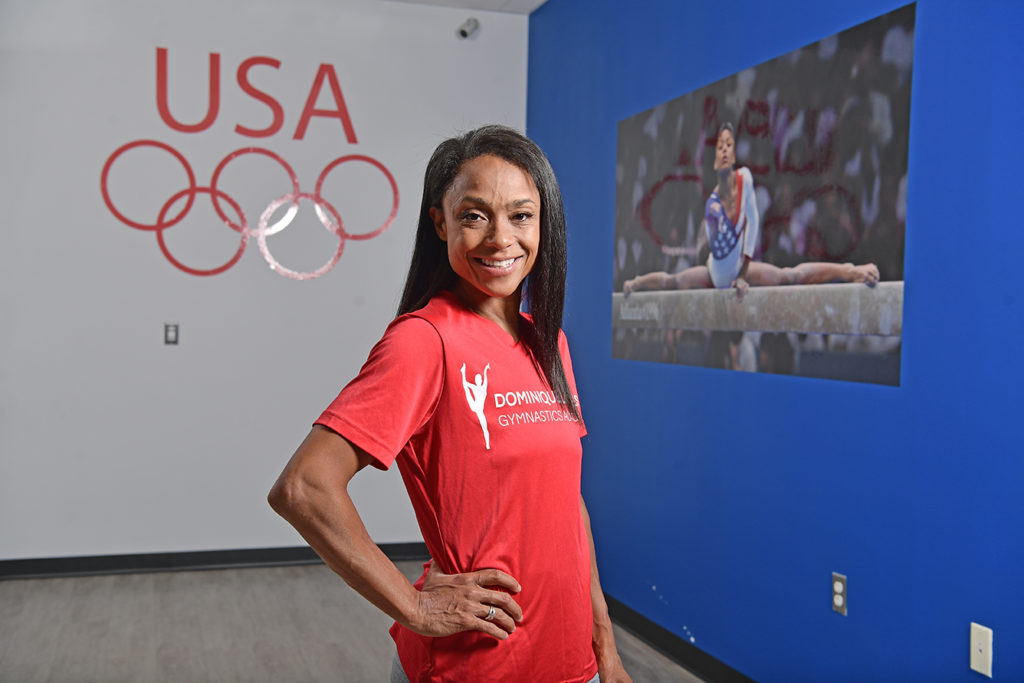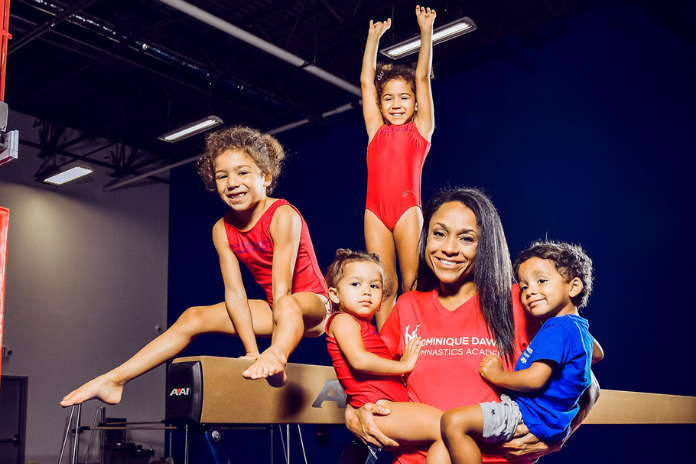
We have local heroes and also those who are famous for Maryland. Then there are
the few who are known to the world.
Dominique Margaux Dawes holds the trifecta.
The Takoma Park-bred former prom queen from Gaithersburg High School was a gymnastics prodigy, becoming the first Black woman to earn a spot on the U.S. National team in 1988 and the U.S. Olympic team in 1992. “Awesome Dawesome” continued to make history throughout her career; as a member of the “Magnificent Seven” at the 1996 Summer Olympics in Atlanta, she brought home the first gold medal for a U.S. gymnastics team and was the first Black gymnast to win an individual event medal.
Now Dawes has returned to her roots, settling in Montgomery County with husband Jeff Thompson, a former teacher at The Heights School in Potomac, and their four young children. Another offspring, which she calls “the family project,” is the Dominique Dawes Gymnastics & Ninja Academy in Clarksburg. The gym offers a variety of gymnastic classes from preschool to high school as well as Ninja Warrior training, which has a foundation in martial arts, challenging obstacle courses and gymnastic techniques.
In our interview at the Academy, Dawes, 43, spoke in blunt terms about the abuse young gymnasts, including herself, have been experiencing for years and why it persists. She was ill prepared for the physical and mental strain of gymnastics—“The level of commitment was astronomical, and the culture was extremely unhealthy,” she says—and decided to open a gym to prove that a safe and positive environment could be created to promote the sport that’s been her life.
Montgomery Magazine: What are your memories of growing up here?
Dominique Dawes: I am a MoCo girl. I grew up in the lower part of Silver Spring near Tacoma Park. My father had a trash and recycling business on Carroll Avenue, and my grandfather, who is 93, has a barbershop (Roland’s Unisex Barber Shop) that is still going.
Q: And now you are raising your own family here.
A: I’m thrilled to be back in Montgomery County. When we got married, my husband and I lived in Silver Spring for a while, then we relocated to Reston, Virginia, to be closer to his family. But we decided we are Marylanders and moved back here with our four kids: a 6- and a 5-year-old and 2 1/2-year-old twins.
Q: Do your kids know that their mom is famous?
A: Oh, my goodness, no. They couldn’t care less about that! I think my two oldest girls, Kateri and Quinn, are curious now that we’ve opened this family business and people are excited to meet Mommy—because I’m just like any other mom in their eyes—and they wonder what is this? So the [kids] are enamored of that. And my husband loves watching videos of my gymnastic days, which I think is kind of odd, but he does it for the kids. And they want me to go out and do my gymnastics routines, and I explain that I’m 43 years old!
Q: Did you always have plans to open your own studio?
A: Never! I can actually guarantee you that I never envisioned where I’m at today. I’d seen the life of many gym owners, and it wasn’t a life I wanted for myself. Not that their businesses weren’t successful, but I looked at the big picture and I felt that the gym owners I did know were not necessarily happy people … so this is not something I envisioned for myself. I love working with kids, motivating them in the sport of gymnastics, but I had not seen a gym owner do it the right way.
Q: What changed your mind?
A: What tipped the scales was Larry Nassar. In 2016, when everything came out about the hundreds of young athletes and that Olympic team doctor, who was a monster—the sexual assaults he committed with those young girls—[it] opened my eyes to the fact that I love the sport of gymnastics but the culture was an unhealthy culture. And that’s why they were able to get away with it for so many decades. The culture in gymnastics in many of the gyms is based on fear, on intimidation and silence. The athletes can be emotionally, physically and verbally abused. So they go to sleep in fear, they wake up in fear, they show up for practice crying, they cry during practice, and they leave crying. No one takes the time to recognize how damaging it is on those young girls. The girls can’t even voice that they are uncomfortable, and for some reason parents are blinded—maybe by the thoughts of a college scholarship—and they don’t see the pain their kid is in today.
Q: What do you tell parents?
A: I’ve done motivational speaking since 1996, and when parents ask me, “Would you put your kids into [highly competitive] gymnastics?” I would respond, “Absolutely not.” It’s a great sport for learning fundamentals, but I don’t want my kids to have the childhood I had. My husband knew nothing about my career—he’s the one person on earth who didn’t watch the ’96 Olympics. And he’s come across pieces of me as a child, and in one I’m about 12 or 13, and he paused it and said to me, “You’re literally crying in the middle of your tumbling routine. Why didn’t anyone recognize this wasn’t a healthy environment for you?” He’s a schoolteacher of nearly 18 years, and he said [that] if parents would open their eyes and see the pain their children are in and recognize the enormous sacrifices some of their children are making—and maybe don’t want to—they will save their children and themselves a lifetime of heartache.
Q: So this experience informs the way you run your academy?
A: My desire with this academy is to create a healthy environment, and each and every one of my staff is vetted by me. If I get a parent who is looking for stardom I tell them this isn’t the environment for them—I tell them flat out. I’m glad I went through what I did because now I know what I want for my children. If they want their kid to go to the Olympics, I tell them this is not the gym for you. I want well-rounded children and families.

Q: Looking back, what athletic achievement gives you the most satisfaction?
A: Coming back from my fall at the Olympics. Winning is one thing, but I learned a lot from my mistake at the 1996 Olympics. It doesn’t haunt me the way it used to. The sport of gymnastics really does train you to become a perfectionist because you focus on what you did wrong; nothing is ever good enough, you’re constantly being judged. So when I had that fall I still had that mindset that my career would be defined by that mistake. But that fall planted a seed of drive and determination that it is part of life and you can choose to get back up and move past it—or you can dwell on it. And that has helped me going through life; I know I’m going to make mistakes in business, for example.
Q: How has the pandemic complicated your business plans?
A: Being unemployed—not a good thing. I had a number of speeches lined up; that is what allowed me to support my family. When those speeches dried up and I was committed to this [gym] and moving forward with it, it was a little scary. It forced me to have a little more faith, maybe, than I had before. My husband said we’ll make it through this, it will make us stronger, and during quarantine this is where all six of us were. We were on a schedule, and we couldn’t stop it.
Q: How well are you meeting your projections?
A: The numbers are significantly lower than what we initially planned, but it’s not bad. We planned for 400, and we just got there. I’m a conservative person. I wasn’t thinking, oh, we’ll have 1,000 people as soon as we open the door. Now we do have 900 people pre-signed up. But even though our start is slow, I’m able to connect with each and every family, to know the kids’ names. I’m able to connect with my staff.
Q: Are you interested in coaching, perhaps even an Olympic team?
A: Do I see myself on the floor coaching? I’m trying not to do it all. I do want to remain married! I want to know my kids. They don’t need mommy as a coach. I have stepped in on a preschool class, but that’s because we were short-staffed due to COVID-19. So
I jumped in. But that’s not where I want to be.
Q: Do you expect to resume doing motivational speeches?
A: I really enjoyed doing motivational speeches, although I didn’t like the travel. Once I started bringing the kids on the road with me, it became harder and harder. I found it to be more of a job than it needed to be.
Q: If you could revisit your past and change it, given what you know now, would you?
A: For a while I dwelled on coulda, woulda, shoulda. Like if only I’d had parents that were a certain way or if only I weren’t in the sport of gymnastics. But I’ve truly embraced the most painful moments of my life because that’s what brought me where I am today, with the people I am today, with the drive and the passion I have today. So even if could write a letter to my younger self, I would just remind her that she’s stronger and more resilient than she thinks. I’d remind her that her greatness is not about her accolades or about achievements, but her heart.
The mother of one of my teammates, Alexis Norman, pulled me aside in 1994 when I was having a tough time in the sport. I had a horrible two months of practice and wanted to quit. She pulled me aside and said, “Remember we love you not because of your talent and ability in the gym but because of who you are.” I broke down; I’d never heard those words before—or since. Her words made such an impression on me.
Q: What do you say to young girls who want to be like Dominique?
A: I would tell them don’t be like Dominique. Be yourself. Be the best that you are. I understand when they walk through this facility and there’s the Olympic photos it’s a draw, as is my name, and moms and dads grew up watching me. But when they come through the door I hope they find that my coaches are upbeat and compassionate. My teammates and I lived in an atmosphere of anxiety and fear. It just alarms me what parents (of gymnasts) don’t see—or don’t want to see. I want ours to be a positive environment and build the kids’ self-esteem.
This interview has been edited for clarity and length.
This story originally appeared in the December 2020-January 2021 issue of Montgomery Magazine.




